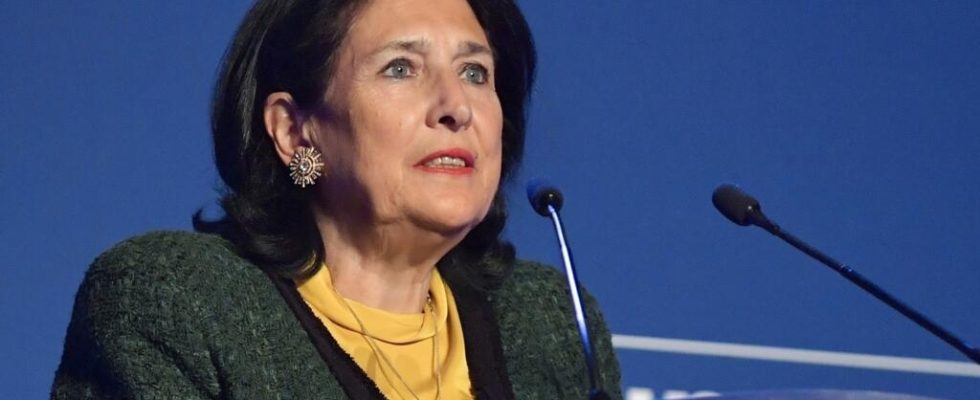Demonstration and counter-demonstration in Georgia around the controversial bill on foreign influence, wanted by the government. The opposition accuses the ruling party, the Georgian Dream, of acting under pressure from its Russian neighbor. The EU, for its part, has already made it clear to Georgia that this law is incompatible with the status of candidate for membership. President Salomé Zourabichvili, who has worked for years for a European future for her country, opposes the government and supports the demonstrators. She gave an exclusive interview to RFI.
From our special correspondent in Tbilisi,
RFI: How do you judge this bill on foreign influence, sponsored by the government?
Salomé Zourabichvili : For the population, in its very large majority, as for me, it makes no sense. At the moment when the Georgia has just received candidate status, in December 2023, and is preparing to be able to open accession negotiations with the European Union – this is in any case what is a possible prospect – it is totally absurd to repeat a law which was rejected not only by the entire population last year, but which was also rejected by our European partners.
[Ces derniers] have very clearly indicated that it was not desirable to have a law which is a copy of Putin’s law on the same subject and which had the consequence of practically killing the non-governmental base, civil society, in Russia.
Do you have the feeling that we are now experiencing a historic moment?
I share with you the idea that we are at a historic moment. I think the historic moment will be the moment of the elections [le 26 octobre 2024, NDLR]and that there, Georgia will have to consolidate its choice, its European choice and that this will be absolutely decisive.
You called Emmanuel Macron and Charles Michel to ask them to address this situation in Georgia during the European Council. What reaction could the European Union take to address this situation? ?
The goal of my communications was that at a time when there are many, many things happening on the rest of the planet, crises that are demanding attention, that this attention should also be given to us. That is to say, Georgia does not leave the field of attention of our main partners because we are at a decisive moment and we will be in this situation, until the end of the year, until to the elections and until the moment when the opening of accession negotiations is determined.
And this attention, I must say that it exists, I have received responses from both. I know that the issue was discussed at the European Council, even though it was not on the formal agenda, and it is very important that this attention remains, that the high-level visits continue and that Georgia remains on the screen, I would say.
For the rest, it is up to us to do everything possible so that the elections give the desirable result and that the recommendations that are on our table are actually fulfilled, so as to allow us to begin the negotiations of membership. Georgia has no right to miss this chance.
The European Parliament adopted a resolution which conditions the start of negotiations on the country’s accession to the European Union by the rejection of this law…
I’m going to put this veto and I put the veto on all the laws – there were several – which went against European recommendations, and it is a highly symbolic gesture which takes into account the will of the Georgian population. The answer to the fact that the veto will surely be overridden by a Parliament, which has the necessary number of votes, will be at the polls in October.
It is the elections which will determine the European perspective and the European choice, and it is clear that the coalition government which will emerge from the elections, if the population confirms its European choice, is a government which will reject all of these laws which do not are not European laws.
I believe and I think and I am convinced that the European authorities, and they have said this several times, are waiting for the elections, the conduct of the elections and the results of the elections to know what Georgia wants. And this is what will condition [leurs] reactions, and nothing in the meantime will lead to sudden changes in the European position.
This law is called “Russian law”. When we talk about Russian influence here in Georgia, what does that mean?
This Russian law does not meet any needs. The functioning and financing of non-governmental organizations or international organizations that have helped Georgia since its independence, all this was [déjà] very transparent. There is no need for this law.
If this serves anyone’s interests, it is those of Moscow because it distances Georgia from the European Union, which has always been one of the ambitions of Russian policy and is reactivated today. So that is a sign of Russian influence. The law on offshore transformed here [une loi fiscale qui permettrait le contournement des sanctions occidentales, NDLR] which serves the interests of Russian oligarchs, possibly punishable or already sanctioned, is also a mark of Russian influence as well as propaganda on LGBT laws… Finally, everything we know about Russian propaganda in Russia and that ‘we find in action here.
Read alsoGeorgia: a protester against the draft “Russian law” released after a year in prison
